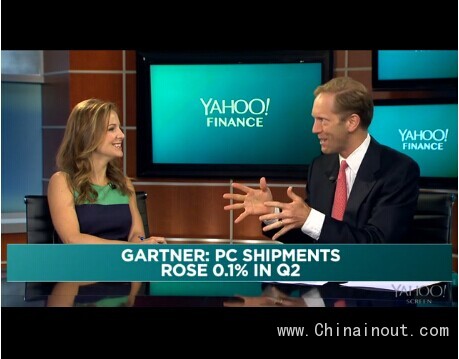
個(gè)人電腦還沒(méi)到窮途末路,至少目前還沒(méi)有,盡管平板電腦的日益普及,“平板”和智能手機(jī)——大型和小型所處可見(jiàn),。據(jù)Gartner 7月的一份報(bào)告,個(gè)人電腦市場(chǎng)今年將經(jīng)歷一個(gè)“相對(duì)復(fù)興”時(shí)期。
當(dāng)然,”Gartner相對(duì)復(fù)興”意味著個(gè)人電腦市場(chǎng)將在2014年繼續(xù)下降,2013年不一樣(放緩分別為2.9%和9.5%),。真正的復(fù)蘇可能發(fā)生在2015年,當(dāng)Gartner了解到個(gè)人電腦銷售實(shí)際上再次上升,漲了5.3%,。(更多全球資訊請(qǐng)點(diǎn)擊瀏覽)
雅虎財(cái)經(jīng)撰稿人Henry Blodget說(shuō):“這遠(yuǎn)遠(yuǎn)不是復(fù)興。我們先在談?wù)摰倪@個(gè)市場(chǎng)是比十年前整個(gè)計(jì)算市場(chǎng)少,。”
布羅吉特說(shuō),盡管如此,只要人們每天需要上班,個(gè)人電腦將會(huì)伴隨著生活,。“很多CEO們談?wù)?‘嘿,我在我的智能手機(jī)上運(yùn)行整個(gè)公司,’”他說(shuō)。“這是因?yàn)樗麄儗?shí)際上并不需要做任何工作,。”
對(duì)CEO委派工作智能手機(jī)可能是不錯(cuò)的選擇,但是創(chuàng)建和使用電子表格或整天打字和發(fā)郵件還需要一臺(tái)電腦,,這在將來(lái)一段時(shí)間也是,Blodget’s認(rèn)為。
“很長(zhǎng)一段時(shí)間,在辦公中我們將會(huì)繼續(xù)使用一個(gè)鍵盤(pán)和一個(gè)大屏幕,“Blodge說(shuō),。“那么,認(rèn)為個(gè)人電腦玩完了簡(jiǎn)直是瘋了,。”
也許不久的一天,你的“個(gè)人電腦”將由智能手機(jī)或平板電腦,但是,要實(shí)現(xiàn)它,還有很長(zhǎng)的路要走,。
目前,平板電腦增長(zhǎng)正在放緩,。Gartner預(yù)測(cè)平板電腦在2014年出貨量將增長(zhǎng)23.9%。這么一個(gè)爆炸性增長(zhǎng),,Gartner作為一個(gè)“放緩”來(lái)定性,。
但“減速”實(shí)際上可能不是一個(gè)足夠強(qiáng)大的詞。百思買(mǎi)首席執(zhí)行官休伯特喬利最近告訴新聞網(wǎng)站Re /代碼,平板電腦銷售正“崩潰”,。
喬利說(shuō),平板電腦面臨的問(wèn)題是創(chuàng)新,。“一旦你有某一代的平板電腦,目前尚不清楚你是否有必要購(gòu)買(mǎi)下一代,”他告訴Re /代碼。
它實(shí)際上是個(gè)人電腦曾經(jīng)同樣面臨的問(wèn)題,。喬利數(shù)大部分在百思買(mǎi)電腦轉(zhuǎn)好遵循這樣一個(gè)事實(shí):微軟不再支持舊Windows版本的,這就迫使人們?nèi)ド?jí),。
到目前為止,移動(dòng)PC和移動(dòng)景觀對(duì)一些最大的科技公司有利好——不管他們押注硬件,軟件,個(gè)人電腦或移動(dòng)端。 (更多全球資訊請(qǐng)點(diǎn)擊瀏覽)
就拿硬件制造商惠普說(shuō),,這是該公司多年來(lái)第一次個(gè)人電腦業(yè)務(wù)收入增長(zhǎng),。這種轉(zhuǎn)變是如此鼓舞人心,首席執(zhí)行官梅格·惠特曼宣布該公司將在硬件業(yè)務(wù)投入多一倍,?;萜展善苯衲暌詠?lái)上漲了約30%,。
在軟件方面,谷歌(GOOGL)公司的受益是無(wú)人能比的。公司的Android軟件仍然是移動(dòng)計(jì)算的無(wú)冕之王,。采用Android移動(dòng)設(shè)備的出貨量將在2014年增長(zhǎng)30%,。
即使是一款備受爭(zhēng)議的微軟(Microsoft)可能會(huì)有所突破。據(jù)Gartner,“Windows手機(jī)將在2014年基數(shù)較低的現(xiàn)狀表現(xiàn)出強(qiáng)勁的增長(zhǎng),從2014年的4%到2018年預(yù)計(jì)將達(dá)到10%的市場(chǎng)份額,。”
當(dāng)然,蘋(píng)果(Apple),。公司——集成硬件和軟件水平還沒(méi)有其他公司掌握,仍有增長(zhǎng)勢(shì)頭。出口的iOS系統(tǒng)設(shè)備將在2014年增長(zhǎng)15%,。
這樣的市場(chǎng)形勢(shì)——很難預(yù)測(cè)到底“個(gè)人電腦”的未來(lái),。根據(jù)Blodget,“個(gè)人電腦仍然是有用的,”得到最終裁決我們還需要些日子。
(更多全球資訊請(qǐng)點(diǎn)擊瀏覽)
The PC is not dead, at least not yet, despite the rising popularity of tablets, “phablets” and smartphones - large and small. According to a July report from Gartner, the personal computing market will experience a “relative revival” this year.
Of course, by “relative revival” Gartner means the PC market will continue to decline in 2014, just not as much as it did in 2013 (slowing 2.9% versus 9.5%, respectively.) The real revival may happen in 2015; that’s when Gartner sees PC sales actually increasing again – jumping 5.3%.
Yahoo Finance contributor Henry Blodget said, “This is far from a revival. We’re talking about a market that was the entire computing market fewer than 10 years ago.”
Still, Blodget said that as long as people need to go to work every day, personal computers will live on. “Lots of CEOs talk about, ‘Hey, I run the whole company on my smartphone,’” he said. “It’s because they don’t actually have to do any work.”
The smartphone may be fine for a CEO who is delegating work, but someone who is creating and using spreadsheets or typing and emailing all day still needs a computer and will for some time, in Blodget’s view.
“For a long time [to come] we are going to use a keyboard and a big screen at work,” says Blodget. “So, the idea that the PC is dead is crazy.”
It may be that one day soon, your “PC” will be powered by a smartphone or a tablet, but that’s a long way off.
For now, tablet growth is slowing. Gartner does predict tablet sales will continue to grow in 2014 with shipments expected to increase 23.9%. It is a testament to just how explosive the growth of the tablet has been that Gartner is characterizing that as a “slowdown.”
But “slowdown” actually may not be a strong enough word. Best Buy (BBY) CEO Hubert Joly recently told news site Re/Code that tablet sales are “crashing.”
According to Joly, the problem facing tablets is innovation. “once you have a tablet of a certain generation, it’s not clear that you have to move on to the next generation,” he told Re/Code.
It’s actually the same problem that once faced PCs. Joly credits a large part of the PC resurgence at Best Buy to the fact that Microsoft stopped supporting old versions of Windows, which drove people to upgrade. (for more global news please click here)
So far, the shifting PC versus mobile landscape has spelled good news for some of the biggest names in tech – regardless of whether they’re betting on hardware, software, PC or mobile.
Take hardware-maker Hewlett-Packard (HPQ). The company recently saw revenue grow in its PC unit for the first time in years. The shift was so inspiring it led CEO Meg Whitman to declare the company would double down on hardware. HP stock is up about 30% year-to-date.
On the software side, no one is benefitting more than Google (GOOGL). The company’s Android software remains the undisputed king of mobile computing. The number of shipped devices running Android will jump 30% in 2014.
Even the oft-maligned Microsoft (MSFT) may have finally caught a break. According to Gartner, “Windows phones will exhibit strong growth from a low base in 2014, and are projected to reach a 10% market share by 2018 — up from 4% in 2014."
And of course – there’s Apple (AAPL). The company – which integrates hardware and software to a level no other company has yet mastered – is still seeing growth. Shipments of devices running iOS will jump 15% in 2014. (for more global news please click here)
So with all of this in the mix – it’s hard to predict what exactly the future of “personal computing” will look like. According to Blodget, “The jury is still out,” and it may be a while before we get a verdict.











